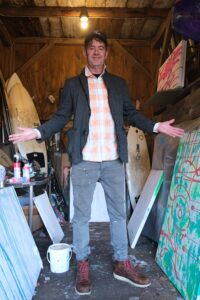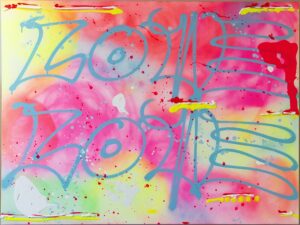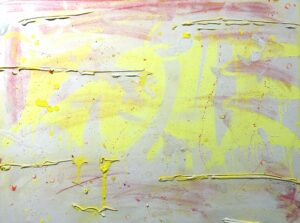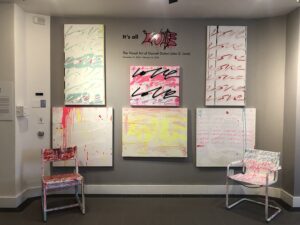Garrett Dutton is best known by his stage name, G. Love. Since the early 1990s, he’s fronted the hip-hop blues band G. Love and Special Sauce, which maintains an active touring schedule. The band’s 2016 album The Juice was nominated for a Grammy award, and this year marks the 30th anniversary of the group’s debut album released on Epic Records.

Before he forged a path in music, Dutton was immersed in graffiti culture. “There was a lot of tagging and styles that were unique to Philadelphia,” says Dutton, who grew up there and now lives in Orleans. He established his own tag — “Look” — which he perfected by practicing obsessively.
“When G. Love took off, that became my tag,” he says. “If you walk into the backstage of any small or medium-size club across the world you’ll see my tags totally bombing all the backstage dressers.”
For a long time, making art was a sidelight to his music career. Dutton performed sitting on chairs or stools, so he began painting them to add some color to the stage. Some fans wanted to buy the furniture, which brought Dutton to thrift shops to replenish his supplies. He started picking up artwork there — “cheesy cat paintings or something,” says Dutton. He would paint over them, frame and all, and use them to decorate the stage at his shows.
Eventually, he bought blank canvases from art stores as his paintings began selling. “It gradually transformed into more of a legitimate thing,” says Dutton. He had his first gallery exhibition in 2006.
Dutton’s art gets the spotlight in “It’s All Love,” an exhibition at the Cape Cod Museum of Art. The works are titled #lovepaints; they all include the word “love.” Sometimes the word fills the entire surface of the canvas; other times it appears repeatedly like a mantra or a phrase a disobedient schoolboy must write on a chalkboard. It stretches horizontally across some compositions; in others, it’s arranged in loose, vertical rows.

The exhibition includes some of Dutton’s painted wicker chairs and stools on which he scrawled his tag — “Love” — in fluorescent colors amid splashes and drips of paint.
The connection to graffiti is obvious throughout the exhibition, but it’s most salient in the paintings that feature “love” written once in stylized letters, like a tag covering a canvas. Certain paintings gesture toward abstraction, creating a dialogue between the text as image and the background of the painting. In these works, the language of street art merges with that of historical and contemporary art.
It’s a territory that Dutton has also explored as a collector. He started attending Art Basel, an international art fair, to perform his music. There he met collectors and artists, eventually acquiring work by contemporary artists rooted in street art, including Maya Hayuk, Shepard Fairey, and Invader. “I was always kind of a collector or a fan at first,” says Dutton.

In one painting, “love” is written in light yellow words. The text struggles to stand out against the white ground, which cuts through the letters. Splatters of red paint and globby streaks of darker yellow further complicate this tug of war between the text, the background, and the materiality of the paint.
Dutton is adventurous in what he does with a single word. In one large-scale piece, the text overlaps and gradually darkens as it moves down the canvas. The words become lyrical, abstracted marks. In some of the black-and-white pieces, Dutton transcends the quick read of spray paint to suggest other materials, like blotchy reproductions from a photocopy machine.
The immediacy of his marks evokes certain strains in contemporary painting (Katherine Bernhardt and Christopher Wool come to mind), but they’re also a by-product of his younger years doing graffiti.

“The act of graffiti writing is a quick thing,” says Dutton. “It’s illegal. You have to do it and then get the hell out.” His paintings still contain that fast, physical, and gestural energy — not unlike the energy a musician might channel while performing on stage.
Dutton sees plenty of overlap between his music and his art practice. “My art has been a creative emotional outlet and a meditation that goes hand in hand with my musical process,” he writes in his exhibition statement. His penchant for the word “love” echoes his sense of purpose as a musician: “My mission as a musician has been to spread love,” says Dutton. But in his art, he finds a degree of freedom that he doesn’t associate with his music career, which in the ’90s involved the pressure of appealing to record labels.

Dutton moved to the Cape from Boston in 2019 with his wife, Kelcey Dutton. The couple now have three young boys. Dutton surfs, records music at Checkpoint East, and has shown artwork at Alias Gallery and Readymade Gallery. The couple’s property, which overlooks a small inlet, is still in transition. It’s a jumble of buildings, including a cottage and a new modern house that the family has not yet moved into.
Toward the back of the property is a wooden barn crammed with art supplies and surfboards — Dutton’s workshop. The old wooden door is marked with errant bits of fluorescent paint. Unlike a recording studio or a stage, this place is completely his, far removed from the pressures and glamor of a music career.

“There’s no one watching,” says Dutton. “There are no expectations of anything for me and no end goal other than to make cool-looking stuff. It’s a great way to connect with myself. I love color, and I love the process. It’s a creatively freeing exercise.”
‘It’s All Love’
The event: The visual art of Garrett Dutton (a.k.a. G. Love)
The time: Through Feb. 16; public reception on Thursday, Jan. 2, 5 to 6:30 p.m.
The place: Cape Cod Museum of Art, 60 Hope Ln., Dennis
The cost: $10 general admission



